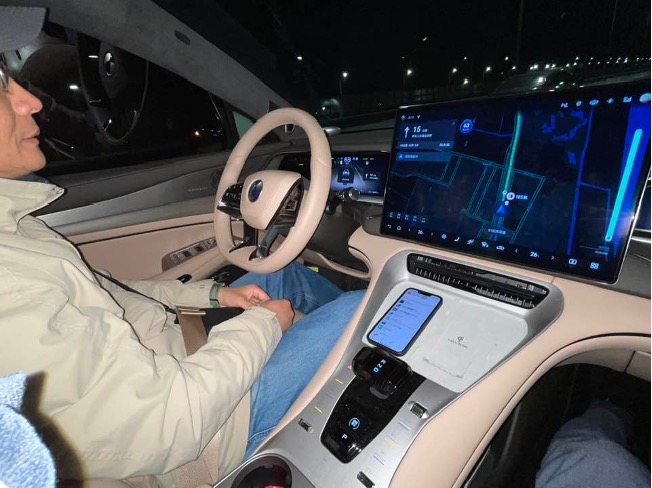Published on 9 April 2025
Driverless Car: Do we still need to know driving?
Professor Joseph Sung
Distinguished University Professor
Senior Vice-President (Health & Life Sciences)
Dean, Lee Kong Chian School of Medicine
Last week, upon arriving at Shanghai airport, my host picked me up with a driverless car. Once we got into the car, a female voice asked where we wanted to go and, within seconds, she responded to our request by showing a map indicating the route, time required and estimated time of arrival. Then, off we go, with the car driving us at 100-105 km/h on the highway, taking me to the hotel safe and sound. Along the way, the AI-machine expertly changed lanes, adjusted the driving pace according to the speed limit, reminded my friend to keep his hands on the wheel, even responding to my request for a seat massage and in-car music. It was absolutely AMAZING.

Technology is advancing so fast, exceeding our imagination. Excitedly, I asked my friend, “Do you need to do anything at all?” He said, he was being “monitored” by the camera inside the car, to ensure he was awake and kept alert. Every 20 minutes or so, he would be requested by the car to put his hands on the steering wheel to ensure that he was still in control (if needed). Then I asked, “Do you think that your driving skill will get rusty? Do you think we need to learn driving in the future? Do you think we need human drivers at all?”. He laughed. I then asked, if we forget how to drive, when things go wrong (such as laser sensors breaking down, satellite turned off, AI got busted), what should we do?
This reminds me of the days when laparoscopic surgery was first introduced, some 20 years ago. The world got excited because what used to be an open surgery with a big laparotomy wound can now be performed with a few keyholes on the abdomen. The pain from surgery and surgery was reduced, vision of operative field became clear, and recovery expedited. Then, suddenly we realised that the training of surgeons would be quite different, even challenging. One may ask, with keyhole surgery and now robotic surgery being practised, do we still need to train young surgeons conventional open surgery? Also, can we find enough cases indicated for open surgery to train young surgeons? If we don’t train surgeons to do open surgery, when things go wrong (such as uncontrolled bleeding, wrong tissue cut, or technical failure), what are the contingency measures?
When technology takes over our routine duties, we should be happy that we don’t need to work as hard as before and endure long hours of exhausting work. However, it begs the question: what then is the role of future doctors? How should we avoid the terrible, but probably inevitable, situation of “deskilling”?
This issue remains unresolved but needs to be discussed urgently. How should we train medical students and young fellows, and senior doctors for that matter? When we skip learning or forget our physiology and anatomy, when we lose our skills in reading radiographs and histology, when we stop practising wound suture and incision, what else is left for us to do?
I believe we still need to know the basics. We must have a basic understanding of physiology and pathology, and know at least the framework of anatomy. We can delegate to AI the details of dosing and side effects of medicine, but we cannot be ignorant about their pharmacological activities and interactions. We can use robots and AI to do simple incision and closure of wound, explore the surgical field and monitor patient’s condition, but we cannot (at least in the next 10 years or so) rely entirely on a ‘robodoc’ to complete the entire surgery. We need to know the basics, and still need to master the knowledge and skills of medicine and surgery.
Besides worrying about deskilling, while dashing at 100 km/h on the highway, I also asked myself, do I trust this machine 100%? Can it actually respond quick enough if someone is not following the rules and laws on the road? Would it be safe on a rainy or foggy day when vision is impaired? What happens if there is an accident on the road and the car is heading towards a crowd of people trying to save me from hitting a brake wall? I admit that even an experienced human driver is not perfect, in fact, far from perfect. But at least, I am in control! And I take full responsibility.
Can I trust a machine to make life-and-death decisions without a doctor and patient’s input? In the management of a medical condition, sometimes it takes more than genomic, epigenomic, meta-genomic and machine learning and generative AI. What about the patient’s values? What about the family’s preference? What about doctor and nurses’ discretion? Granted, the driver-and-car relationship may not be as complicated as the doctor-and-patient relationship. A lot of clinical decisions are based on a patient’s trust in their doctors and nurses looking after them for months and years. The reputation of the hospital and the clinic, the rapport between patients and doctors, the years of experience and personal knowledge of doctors for their patients… these count and matter!
Bill Gates said a few weeks ago: with AI, many jobs will disappear in the next 10 years. Doctors and teachers will be replaced. I disagree.
